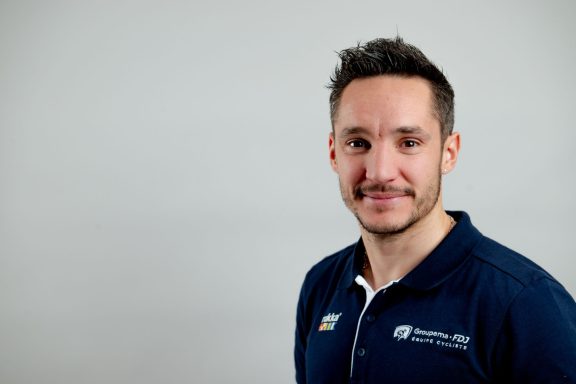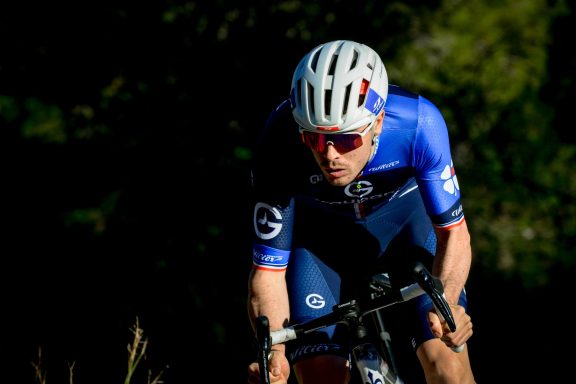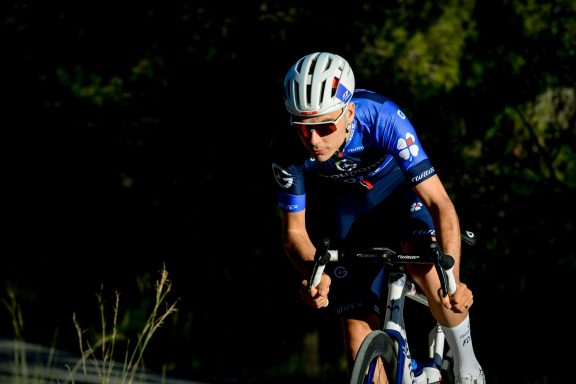In 2020, he was the youngest rider of the “Conti” Groupama-FDJ’s roster. For his first year as a pro, Paul Penhoët experienced quite a special season, to say the least. The 19-year-old sat down to talk about it and also to tell more about his cycling course, which is already well advanced, in order to get to know him better.
While some get interested in cycling late in their childhood, after unsuccessful attempts in other sports, Paul Penhoët, on the other hand, showed his interest at an early age. It came after a very brief football try, and without any real inspiration from his environment. “None in my family came from the cycling world, not even my grandparents,” he says. “Nobody knew anything about it, I really was the first one”. He was only seven years old when he asked to join a cycling club, without really knowing why – apart from some holiday at the Tourmalet and the memory of a boy on his racing bike he thought “classy” -. “My parents thought it was a great idea, but that it was still a bit early. They told me to wait and that they would sign me up the following year if I were still motivated. The year passed, I did not lose any of my motivation, so they enrolled me in Clamart, my first club, where I still have my membership card”. Although he is now only 19 years old, Paul Penhoët has already had about ten years of practice, but the very first ones had obviously more to do with hobbies than competition. “We only trained once a week, on Wednesdays,” he recalls. “It would last about an hour and a half, but the idea was mostly to meet up with friends. We did little races in the Clamart’s wood, skills games, it was really cool and it made me want to continue. Also, there was a little snack at the end of each training session (smiles)”.
Training in an industrial park, a “long” wait for the first victory
During his first years in the saddle, from 8 to 13, the Frenchman did not really stand out in the weekend races. While he certainly enjoyed “competing against boys” from other clubs and was already attracted by the win, he was realistic about his own level. “I was not strong at the time”, he laughs. “I knew I wasn’t going to win, but that was okay with me. I wouldn’t be like that at all now, but looking back on it, it’s true I didn’t mind then. Even though I didn’t win, I could see that I was improving. Little by little, I was holding the peloton better, I could attack two, three times, and just doing that was a satisfaction. It showed that I wasn’t training for nothing”. Speaking about training: coming from the Parisian suburbs, Paul Penhoët had to wait many years before going to explore the wide open spaces of the Chevreuse valley. Initially, the city of Clamart offered him a playground. First thanks to its wood, then, around 13-14 years old, through its… industrial park. “Since we were still young and we still had school, we could only go to train at night”, he explains. “It was dark so we had to go there because it was lit up. The problem was that there were a lot of cars; people were getting out of work. It was a bit annoying”. Without a particular connection, he got his first victory on a bike at that age, in a duo mountain bike race.
Rather a road cyclist, Paul Penhoët also tried mountain biking and cyclocross within his club. However, entering the U17 category, he discovered track cycling and instantly got in love with it. So much so that he climbs on the podium in his very first competition. On the other hand, he had to wait until the following season to notice kind of a turning point in his favourite discipline. “In my second year as U17, I won my first road race”, he recalls. “And a week later, I won my second one. That’s when I started training a little more seriously than the other guys of my club. My trainer at the time set up a personalized program for me. The fact that I won, while I had never done it before, changed a lot of things. You get to think: I was the best today, it’s worth keeping pushing to see how far it can go”. Successful on the regional scene, Paul Penhoët also benefited from the “great trips” organized by his club in other French areas, especially on some rounds of the famous Madiot Trophy. The level was still a bit too high for him, but he was not “way behind” either. In 2017, he even managed to net a handful of top 15 in the Challenge, especially an eleventh place on the Chateaubriand’s time trial won by … his future teammate and roommate, Hugo Page.
A junior course divided between velodromes and the road
He therefore had some certainties and most importantly the will to work hard when he entered the juniors’ category, though he would not consider his cycling future just yet. “In my first year, I was not yet thinking of a professional career”, he says. “I actually did more track because it was not going so well on the road. As a Junior 1, my goal was to compete with the French track cycling team. They organized several camps, and reduced the group after each one of them. I made it to the last one, which I would never have imagined, it worked and they told me I was selected for the world championships. I was super happy”. In the meantime, the young man also won five regional track titles. “I don’t know why I was better than on the road”, he says. “Perhaps because these are violent and short efforts, and that suits me. I also like the tactics of track racing as you have to think quickly while being at a maximal effort”. Although less successful, his road season was still embellished with a nice title in his regional championship. However, his priority remained the track and the Worlds, where he teamed up with Donavan Grondin in the Madison. “We had won everything in the French Cup, the duo was working really well,” he says. Winner of their series at first, the duet ultimately finished in sixth place, Paul suffering from cramps during the final. “It stuck in our throats, he continued, but this World Championship was a great experience. To wear the French jersey for the first time was something amazing”.
So much so that he set himself the goal to get back in the country’s jersey the following season. But on the road, this time. “Having taken part in the world championship, which is the pinnacle of what I could do on the track, I told myself: ‘this year, put everything on the road, let the track aside a little and we’ll see what comes’. I didn’t change much in training. It was rather psychological. I took everything a little more seriously, I made fewer mistakes.” With his regional champion’s jersey – “a good pressure”, he first finished eighth in the Boucles de Seine-et-Marne and then sixth in the Bernaudeau Juniors, which, as hoped, opened the doors to him of the French national team for Paris-Roubaix. He got another call from the selection a few weeks later for the Juniors’ Course de la Paix, where he successively got 2nd, 3rd and 4th, only losing the green jersey for one point. “Being able to get some results on the international scene was a real boost for confidence”, he says. “When I got to the Course de la Paix, I really didn’t think I was capable of doing that. It was a big click, that’s for sure. Starting the season, I wouldn’t even have imagined being able to participate in these races, so even less to perform there”. He confirmed his progression by winning two races on French territory, on the Tour du Couesnon Marche de Bretagne and La Cantonale, then placed sixth in the Route des Géants and got in the top 10 of the European Championship in Alkmaar. “This season pretty much went as I would have hoped.” So much so that the management of the “Conti” Groupama-FDJ, newly established, got interested in him.
“I was told it was a big mistake”
“Throughout the year, I was in contact with Nicolas Boisson. Then, at the French track championships, Joseph Berlin Semon, who is now my coach, told me about the project and I liked it. I then went to Besançon to meet Jens Blatter, Fred Grappe and that’s when I really accepted the offer”. At the time he signed his first pro contract, Paul Penhoët, born on December 28, was not yet an adult. Still he made the choice to join a professional organization in his first year U23, despite contradictory opinions. “A lot of people told me ‘this is a big mistake, you have to start like everyone else, in the amateur ranks”. I tried to make up my own mind and I understood they were saying that because they had been in the business for a long time. But things have changed. Teams are recruiting younger and younger. If I hadn’t signed last year, what tells me I could have signed later? I think that when the opportunity arises, it should not be ignored.” The young man also says he was “reassured” by his future team’s speech. “I was told that I was not expected to get immediate results, that the workloads would not be the same as for the U23 in their fourth year, that I had no pressure”, he said. “They wanted to let me improve at my own pace. My goal was to learn at the highest level and get a bigger engine”.
Obviously, the year 2020 did not follow the most traditional pattern. The Frenchman only competed in one race before the season temporarily stopped. Then, following the first lockdown, he returned to Besançon where he trained for two months with his roommate Hugo Page. “I felt great on the bike, I was breaking lots of power records, I had my calendar and I was focused, motivated and relaxed”, he says. “Unfortunately, two days before my return, I got ill. It was then a pain until the end.” Due to a bacterium that left him “super weak, feverish” and with “cold sweats at night”, Paul Penhoët never regained his entire means in 2020. He also was disadvantaged by the Conti’s new calendar, way more suitable to the climbers, but he took advantage of the bridge with the WorldTeam to compete in the Brussels Classic and Paris-Chauny with the A squad. “In the end, it was just as well as I was able to do races of 200 kilometers, and I think it helped me,” he adds. “Seeing that things went well in Brussels (24th, editor’s note), I told myself that the bacterium had disappeared and that I could start again on a right foot. But it did not.” He only did five days of racing after that, and was not able to perform as he would have hoped.
Keeping the best of 2020
However, in spite of his first year U23’s complexity, the young man is aware that everything is not to be thrown away. First, his evolution was not interrupted by the Covid-19 crisis. “I’ve talked to the coaches about it and the big positive point I got from my season is training. I noticed that I could take on the loads well and I felt that I had improved from my junior years, even without the racing pace.” On the other hand, he gained valuable experience with the WorldTeam. “When I signed with the Conti last year, I didn’t think I could participate in races like these. So being able to do it and see that I was not out of the game, it’s still a positive point of the season. I was able to get an idea of the level among the big boys, especially in the Brussels Classic. It was a typical racing pattern, and you learn a lot living it from the inside.” The third point is not related to sports. “I have gained a lot in terms of autonomy. I had just passed my driving license, then doing your own shopping, paying for everything, cooking for yourself, doing your laundry, it gives you new responsibilities. I think it brought me a lot, I think I got more mature. My parents also told me I changed.”
Finally, Paul Penhoët is realistic about his condition with regard to the general context. “I’m really putting things into perspective”, he adds. “You might think it’s a wasted season at first, but then you talk to your teammates and realize it’s even worse for them. I have been fortunate enough to approach the year with serenity. I didn’t have the pressure of an ending contract. I was under a lot less pressure than others and I was able to take it all with more perspective. At the time, as a competitor, I was gutted, but I moved on and turned to 2021″. With the Conti, where he sees eight new teammates coming along, the 19-year-old has only one goal this year. “I have plenty of motivation and I want to win races, clearly”, he said. “Some sprinters are coming into the team but I think we will each and everyone have our chance, there will be many fronts”. It is indeed in the fast men’s area that Paul Penhoët seems to have found his way. “For now, this sprinter profile stands out”, he agrees. “But in the future, with a bigger engine and more watts, I’ll maybe get through the hills pretty well. Anyway, I don’t mind climbing; I like it, so I think that’s already a plus, psychologically. I like the idea of a complete sprinter in the sense that you’re one of the only sprinters to go over the climb. On the other hand, I don’t want to be a sprinter who goes through the climbs but who’s not up there in the real sprints. I like the massive ones. That’s what really drives me. The last three kilometers, the adrenaline rush of the sprint, that’s what I find most exciting”.
“I don’t want to mix everything up”
From this point of view, his experience on the track is often useful to him “to sneak in, not to be boxed in”. “It has almost become instinctive,” he adds. “I know if I can pass or if I can’t, I know where to go. I picture the sprint and I know what to do”. This allows him to approach the finish line with a lead-out train, “always the best solution”, but also without. “It’s good to be able to manage on your own because there are races where things don’t go smoothly, where you lose each other and some sprinters cannot operate without a train.” He particularly notes this skill in Caleb Ewan, a rider that “inspires” him and in which he can somewhat “recognize himself”, “perhaps because he is small”, smiles the 1.74m-tall rider. Either way, it remains clear to the young Frenchman that sprinting will remain, at least in the medium term, his priority. “Milan-Sanremo makes me dream, of course”, he concludes, “but overall all the races that finish with the sprint, including the Grand Tours stages, interest me. This is really what turns me on. Maybe with age, with more strength and tactics, it will be possible to focus on the Classics, but I don’t want to mix everything up from the start and get lost.”




No comment